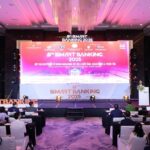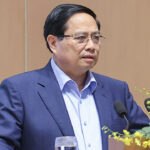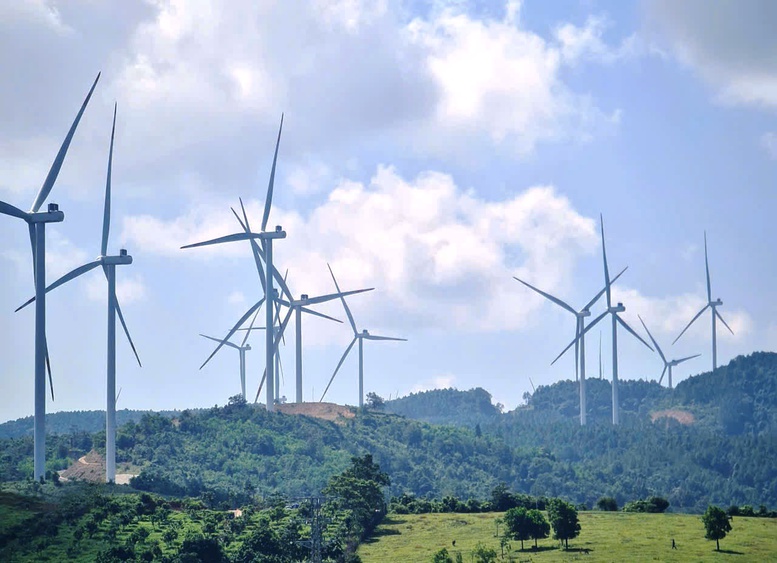
Quang Tri leverages energy industry, high-tech industry, digital economy, and logistics as growth drivers – Photo: VGP/Nhat Anh
A Strong Transformation in the 2020-2025 Period
According to the Political Report of the 1st Quang Tri Provincial Party Congress, during the 2020-2025 period, the Party Committee and the people of the province have demonstrated high determination, dynamism, creativity, and decisive action. They have overcome difficulties and implemented the Resolution of the Provincial Party Congress, achieving significant milestones across political, socio-economic, defense, security, and foreign affairs sectors.
Party building has been positioned as the “key” focus, with synchronized efforts yielding comprehensive results. The reorganization and streamlining of administrative apparatuses have been effectively implemented, reducing 18 district-level units and 186 commune-level units. The two-tier government system has quickly stabilized, operating with increasing efficiency, transparency, and professionalism. The active role of the Fatherland Front and mass organizations has been further affirmed, especially during challenging times, natural disasters, and pandemics.
The average GRDP growth rate for the 2021-2025 period reached 6.8%/year, with an expected 8% increase in 2025. The economic structure has shifted towards increasing the share of industry, construction, and services, while reducing the agricultural sector’s proportion. The per capita GRDP in 2025 reached 79.1 million VND, a 1.6-fold increase compared to 2020. The province has effectively harnessed its potential and advantages, particularly in tourism, services, energy, forestry, and marine economies.
The industrial sector, especially renewable energy and manufacturing, is gradually becoming a new growth driver. The average value-added growth rate in the industrial sector reached 10.2%/year. Industrial parks, economic zones, and industrial clusters have received significant investments, creating a favorable environment for business development.
Tourism has flourished and is becoming a key economic sector in the province. Tourism infrastructure has been comprehensively developed, with many large-scale tourism products and sites being introduced, enhancing Quang Tri’s position on Vietnam’s tourism map.
Agricultural production is transitioning towards sustainable, eco-friendly, green, circular, and high-tech farming, focusing on quality and efficiency. The province has capitalized on its strengths in forest carbon credit trading, with forest coverage reaching approximately 61.5%. Efforts to combat IUU fishing have been intensified, promoting sustainable fisheries development. Rural areas have seen significant improvements and innovations.
Over the past five years, Quang Tri has mobilized nearly 290 trillion VND in development investment capital, an 1.8-fold increase compared to the previous period. Several key transport infrastructure projects connecting regions have been initiated, including the North-South Expressway section passing through the province, opening up new development opportunities.
Culture, education, training, science, technology, healthcare, employment, and sustainable poverty reduction have seen significant improvements, enhancing the people’s quality of life. The program to eliminate temporary and dilapidated houses has been vigorously implemented, with 100% of the 2025 plan completed. Foreign affairs activities have been actively carried out. Political and social stability has been maintained, along with national defense, security, and public order.
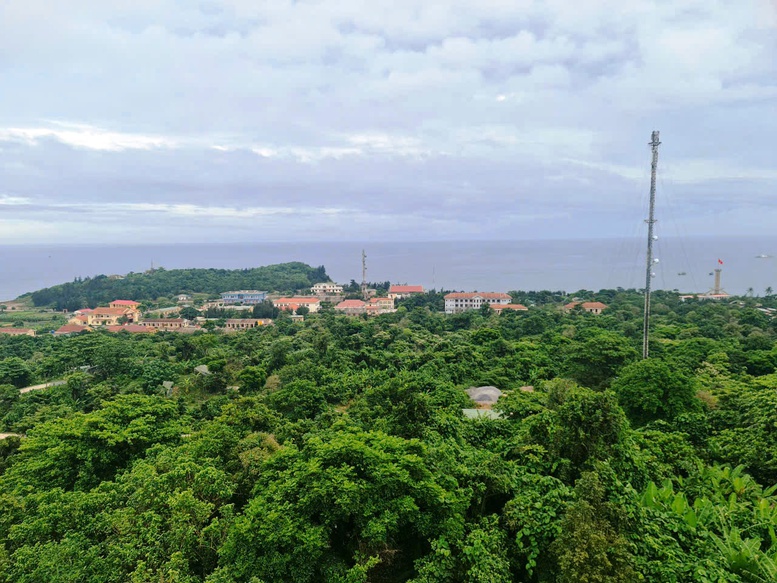
Con Co Island with significant potential for marine economic development – Photo: VGP/Nhat Anh
4 Strategic Pillars: Energy – Logistics – Tourism – Green Agriculture
Following the merger with Quang Binh, Quang Tri faces new opportunities as its development space expands from the mainland to the sea and islands. With a natural area among the top 10 largest provinces and cities in the country, its strategic location for defense and security serves as a bridge between the North and South of Vietnam and neighboring Lao provinces. This enables the mobilization of resources and the unlocking of potential for breakthroughs in the coming years.
The Political Report of the 1st Quang Tri Provincial Party Congress sets the goal for the 2025-2030 period: to build a clean, strong, and comprehensive Party organization and political system; enhance the Party Committee’s leadership capacity and combat strength. It aims to implement breakthrough measures, foster innovation, digital transformation, scientific and technological development, and harness potential and advantages for socio-economic development, ensuring green growth. The focus is on developing synchronized and modern infrastructure, leveraging the new development space, and exploiting the potential of the East-West Economic Corridor to boost economic and trade development. Emphasis is placed on human resource development and cultural and historical values, comprehensively improving the people’s quality of life. Ensuring national defense, security, social order, and safety, and enhancing foreign affairs effectiveness are also priorities. The goal is to establish Quang Tri as a new growth pole in the Central region, aspiring to become a well-developed province and a national hub for energy, logistics, and distinctive tourism by 2045.
Quang Tri will focus on green, sustainable, and comprehensive socio-economic development, integrating with the four strategic pillars of “Energy – Logistics – Tourism – Green Agriculture.”
Economically, Quang Tri aims for a GRDP growth rate of 9-10%/year. For the 2026-2030 period, state budget revenue is expected to reach 75-80 trillion VND, with implemented investment capital totaling 500-520 trillion VND. By 2030, the GRDP at current prices is projected to reach 227-238 trillion VND, with per capita GRDP reaching 137-145 million VND.
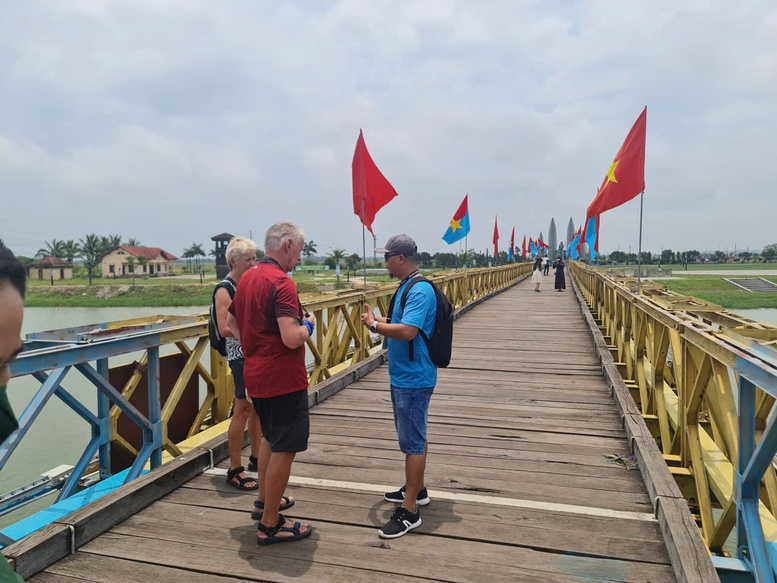
Visitors at the Hien Luong-Ben Hai Historical Relic Site – Photo: VGP/Nhat Anh
5 Key Tasks for the Upcoming Term
To achieve these goals, Quang Tri Province has identified five key tasks for the upcoming term.
The province will focus on building a clean, strong, and comprehensive Party organization and political system, enhancing the Party Committee’s leadership capacity and combat strength. It will improve the government’s management efficiency and the Front’s operational quality. Strengthening inspection, supervision, and the fight against corruption, waste, and negativity is a priority. The two-tier government apparatus will be operated efficiently, effectively, and productively. There will be significant reforms in personnel work, building a capable cadre team at all levels, especially at the grassroots, to meet the new development requirements.
The focus will be on rapid and sustainable economic development, driven by energy industry, high-tech industry, digital economy, and logistics. The economic structure will shift towards increasing the share of high-quality services. Efforts will be made to establish growth poles linked to the Hon La Economic Zone and the Southeast Economic Zone, leveraging the roles of two deep-sea ports, two airports, international border gates, and the vertical and horizontal transportation systems to expand development space and inter-regional and international connectivity. The development of synchronized and modern strategic infrastructure will be accelerated.
Breakthroughs in science, technology, innovation, and digital transformation will be pursued, with the establishment of an Innovation Center gathering scientists and experts to develop and implement strategies, plans, and development programs. Synchronized digital infrastructure and big data platforms will be built and operated effectively, developing e-government, digital economy, and digital society. The application of digital technology in education, healthcare, urban management, and agricultural production will be promoted.
Tourism will be further developed as a key economic sector, leveraging natural world heritage, tangible and intangible cultural heritage, and cultural and tourism industries. Comprehensive education quality will be improved, and a modern, equitable, and efficient healthcare network will be developed. Social security policies, gratitude activities, poverty reduction, and sustainable job creation will be effectively implemented.
National defense and security will be strengthened to maintain political stability and social order. A strong, regular, elite, and modern military force will be built. Effective measures will be taken to combat various crimes, especially high-tech, drug-related, and transnational crimes. International cooperation in defense and security will be enhanced to ensure national security, economic security, cyber security, and human security.
How Have Four Strategic Resolutions Transformed the Banking Industry?
Vietnam is entering a transformative era marked by the rapid introduction of four pivotal strategic resolutions. Amid this shift, the commercial banking sector, as the economy’s driving force, is proactively unveiling critical plans to align with significant changes set to unfold in the coming year.
Deputy Governor of the State Bank of Vietnam: 98% of Customers Now Conduct Transactions via Digital Channels
At the annual Smart Banking 2025 High-Level Seminar and Exhibition, themed “Breakthrough Digital Transformation in Banking: Data as the Foundation, Customers at the Center,” Deputy Governor of the State Bank of Vietnam (SBV) Pham Tien Dung revealed that 98% of customers now conduct transactions through digital channels.
Prime Minister Mandates Immediate Smart City Implementation in Six Major Cities
The Prime Minister has mandated that relevant ministries, agencies, and six key cities expedite the approval of smart city proposals by September, with immediate implementation to commence in 2025.



